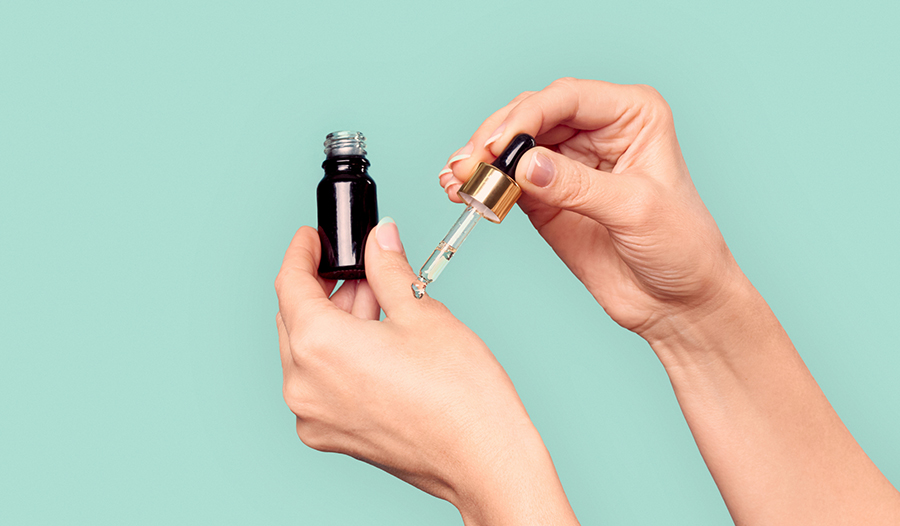Ask A Derm: What Ingredients Should I Look For In My Skincare?

As we age, our skin undergoes a series of changes due to all the environmental triggers it has been exposed to over the years. These changes that occur in response to toxins such as pollution, UV radiation from the sun, stress, and tobacco can result in sagging skin texture along with wrinkles and discoloration in the form of dark and white spots. Anti-aging has become a billion-dollar industry, but what are some of the ingredients that actually work to counteract these changes?
What Causes Skin Aging?
Before we get into the ingredients, let’s take a look at what aging does to the skin on a cellular level. Two types of aging exist: natural aging which occurs with time, and photoaging, caused by the sun. Over time, our skin loses elastin, which keeps our skin supple and stretchy, and collagen, which helps keep the structure of the skin. We also lose hyaluronic acid, which is a naturally occurring humectant that helps our skin retain moisture.
Then there’s aging from the sun, which occurs from UVA and UVB radiation. That causes leathery texture of the skin, growth of blood vessels and red spots, brown discolorations, and wrinkles.
Now that you know what causes aging in the skin, what are some ingredients we can look for to incorporate into our skincare regimen to prevent and treat these changes? We will discuss three important ingredients today: vitamin C, hyaluronic acid, and antioxidants.
What Is Vitamin C?
Vitamin C, also known as ascorbic acid, is a type of antioxidant that helps to neutralize the damage from free radicals caused by exposure to pollutants such as UV radiation, smoke, and stress. It has several benefits to the skin, namely in terms of collagen production, repairing sun damage, and even brightening tan and dark spots.
I mentioned earlier that collagen is what gives your skin its structure and maintains its shape. Vitamin C is actually needed in a crucial step of collagen formation. Researchers have found that it can help skin cells in petri dishes produce more collagen, and in theory, vitamin C used on the skin in people can help to produce more of this molecule that gives your skin strength and elasticity.
Vitamin C helps with anti-aging through its antioxidant properties by reducing DNA damage caused by exposure to pollutants. Regular use of vitamin C helps to minimize and reduce the appearance of fine lines and wrinkles.
Vitamin C also helps to fade and prevent the development of brown and tan spots from the sun in a few ways. First, vitamin C inhibits a certain step in the production of melanin, or pigment, in the skin. Secondly, through its antioxidant properties, it changes melanin, or pigment in the skin, into a colorless form instead of a brown-tan appearance.
Vitamin C is very fickle and hard to stabilize, and you need to be careful which formulations you buy in order to make sure that the product you’re using is actually delivering its purported benefits. It is broken down by light, heat, and exposure to oxygen, so make sure to store your vitamin C in a cold, dark place (like the fridge) and wrap your bottle in aluminum foil to prevent light exposure. Once vitamin C turns a dark copper or brown color, it has likely been oxidized, and it is no longer as effective.
What Is Hyaluronic Acid?
Another powerful ingredient in the anti-aging world is hyaluronic acid, a naturally occurring humectant that helps retain moisture in the skin. In fact, one molecule of hyaluronic acid can hold up to 1000 times its weight in water! We naturally lose hyaluronic acid as we age, leading to dry and wrinkled skin. I always recommend buying moisturizers or serums with hyaluronic acid in them to help replenish your supply. Because hyaluronic acid helps your skin retain water, it results in a more youthful appearance, with a more volumized, glowing look. It can also help with the production of fine lines and wrinkles because when your skin is dry, it is more prone to forming lines with repetitive movements.
An especially great area to use hyaluronic acid is in moisturizers, serums, or ampoules around the eyes. The skin around the eyes is particularly thin, sensitive, and prone to wrinkling, and using a hyaluronic acid-based moisturizer can greatly help to improve the appearance of this area.
What Are Antioxidants?
We already talked a little about antioxidants in the section above since vitamin C is a type of antioxidant, but there are numerous other antioxidants that exist in the skincare realm that can be used to help with anti-aging. As our skin is exposed to pollutants, stress, smoking, radiation, and UV radiation (among countless other triggers), unstable reactive oxidative species are generated, which actually break down collagen and contribute to aging. Antioxidants are an important class of compounds that help to neutralize that damage, thereby helping to prevent and treat signs of aging on the skin.
In addition to Vitamin C, other antioxidants include vitamin A, vitamin E, resveratrol, niacinamide, coenzyme Q10, and flavonoids, just to name a few.
- Vitamin A, also known as retinol or in prescription strength, retinoids, are the holy grail product for dermatologists. Studies have shown that using retinoids on your skin helps to stimulate collagen growth and increase the thickness of your skin, as well as improve fine lines and wrinkles, dark spots and leathery texture as well as enlarged pores. When you’re starting retinoids, make sure to go slowly, only using a pea sized amount for your entire face a few times per week, since it can really be irritating and drying when you first use it. As your face adjusts to the exfoliating properties of vitamin A, you can start using it nightly.
- Vitamin E is commonly used with vitamin C to help the skin repair itself; in fact, studies have shown that their antioxidant effects are stronger when used together.
- Resveratrol is derived from blueberries, cranberries, red grapes and wine, and helps to fight off environmental stressors as well as diminish the appearance of red, irritated skin. It is commonly used in night creams and serums to help with a more rejuvenated and refreshed appearance.
- Niacinamide, also called vitamin B3, is a powerful antioxidant that is also used to help treat red spots and tan and brown discoloration on the skin. It can also help to reduce fine lines and inflammation that results in hyperpigmentation. I also use it in my clinic to treat clinical conditions such as rosacea.
- Coenzyme Q10 is a naturally occurring enzyme that is essential for the production of energy, and also has strong antioxidant properties. We lose levels of coenzyme Q10 as we age, partly due to radiation damage from the sun. Studies have shown that when skin cells are exposed to coenzyme Q10, they have an increased ability to neutralize free radical damage and greater antioxidant capabilities.
- Flavonoids are polyphenols derived from plants that help to reduce inflammation, redness and oxidative stress from UV radiation. They are especially useful in eye creams because they are gentle to the sensitive skin around the eyes. They are also popular for treating redness and dark undereye circles.
Your skin’s needs change over time, but it’s important to make sure it’s getting the right nutrients at every stage. With all the benefits and few downsides, there’s no reason to wait to introduce these ingredients into your skincare regimen at any time!
DISCLAIMER:This Wellness Hub does not intend to provide diagnosis...
















































































 Table of Contents
Table of Contents


